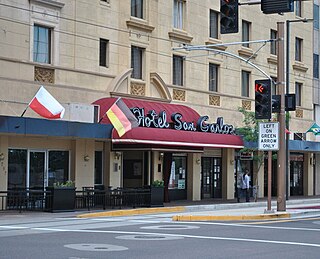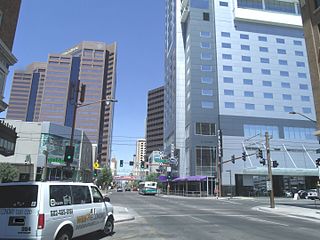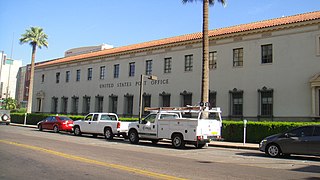
The Hotel San Carlos branch in Phoenix, Arizona, also known as San Carlos Hotel, is both an operating hotel and tourist site. It has been associated with ghost sightings. It was listed on the National Register of Historic Places (NRHP) in 1983 as San Carlos Hotel. Hotel San Carlos is a member of Historic Hotels of America, the official program of the National Trust for Historic Preservation

The Arizona Biltmore is a historic resort located in Phoenix near 24th Street and Camelback Road. Designed by Albert Chase McArthur, it opened on February 23, 1929, as part of the Biltmore Hotel chain. Actors Clark Gable and Carole Lombard often stayed there and the Tequila sunrise cocktail was invented there. It is part of LXR Hotels & Resorts.

Downtown Phoenix is the central business district (CBD) of the City of Phoenix, Arizona, United States. It is in the heart of the Phoenix metropolitan area or Valley of the Sun. Phoenix, being the county seat of Maricopa County and the capital of Arizona, serves as the center of politics, justice and government on the local, state and federal levels. The area is a major center of employment for the region, with many financial, legal, and other national and international corporations housed in a variety of skyscrapers. Major arts and cultural institutions also call the area home. Downtown Phoenix is a center of major league sports activities, live concert events, and is an equally prominent center of banking and finance in Arizona. Regional headquarters for several major banks, including JP Morgan Chase, Wells Fargo, US Bank, Bank of America, Compass Bank and Midfirst Bank are all located within or close proximity to the area.

KPNX is a television station licensed to Mesa, Arizona, United States, serving the Phoenix area as an affiliate of NBC. The station is owned by Tegna Inc., and maintains studios at the Republic Media building on Van Buren Street in downtown Phoenix ; its transmitter is located atop South Mountain on the city's south side.

KFYI – branded News/Talk 550 KFYI – is a commercial news/talk radio station licensed to serve Phoenix, Arizona. Owned by iHeartMedia, KFYI serves the Phoenix metropolitan area as the market affiliate for Fox News Radio, The Clay Travis and Buck Sexton Show, The Sean Hannity Show, the Glenn Beck Radio Program and Coast to Coast AM.

KNAI is a regional Mexican-formatted AM radio station in Phoenix, Arizona. KNAI is owned by the Chavez Radio Group. Its studios are located in Phoenix near Piestewa Peak and its transmitter is in South Phoenix near Broadway and 27th Avenue.

The Westward Ho is a high-rise building in Phoenix, Arizona. The 16-story building, which is 208 ft (63m) to the roof, held the title of tallest building in Arizona for over 30 years until the completion of the Meridian Bank Tower in 1960.

KGME is a commercial radio station in Phoenix, Arizona, featuring a sports format known as "Fox Sports 910." Owned by iHeartMedia, the station's studios are located in Phoenix near Sky Harbor International Airport, and broadcasts with 5,000 watts—directional at night—from a transmitter site at the intersection of 30th and Maryland Avenues in north Phoenix. In addition to a standard analog transmission, KGME is relayed over the third HD Radio subchannel of KESZ and is available online via iHeartRadio.

Chase Tower is a 40-story skyscraper at 201 North Central Avenue in Phoenix, Arizona. Opened in 1972, the building was designed by architects Welton Becket and Fred M. Guirey. The skyscraper is located in Central Avenue Corridor, an economic and residential region of Downtown Phoenix.

The F. Q. Story Neighborhood Historic District is located in central Phoenix, Arizona, United States. The neighborhood runs from McDowell Road south to Roosevelt Street and from Seventh Avenue west to Grand Avenue. The neighborhood as well as many of the individual houses are listed on the National Register of Historic Places.
KTAR-FM is a commercial radio station licensed to Glendale, Arizona, and serving the Phoenix metropolitan area. It is owned by Salt Lake City–based Bonneville International, a profit-making division of the Church of Jesus Christ of Latter-day Saints. KTAR-FM broadcasts a news/talk radio format.
KTAR is an AM commercial radio station licensed to Phoenix, Arizona, United States. Owned and operated by Bonneville International, it features a sports format airing programming from ESPN Radio. The studios are located in north Phoenix near Piestewa Peak, and the station broadcasts with 5,000 watts from a transmitter site near the corner of 36th Street and Thomas Road.

The Central Avenue Corridor is a significant stretch of north–south Central Avenue in Phoenix, Arizona. Roughly bounded by Camelback Road to its north, and McDowell Road to its south, this is one of Phoenix's most vital and heavily trafficked stretches of roads. It is also one of the region's largest centers of employment, with nearly 60,000 people being employed within a three-mile (5 km) radius of this swath of Central Avenue. Major employers here include major banks and financial institutions, hi-tech companies, and several significant law firms and government agencies.

The Professional Building in Phoenix, Arizona is an Art Deco skyscraper. Built in 1932, it is 171 feet (52 m) tall. Angles and setbacks are played up in this streamlined Art Deco design. A central tower rises from the two-story base with a wing on the western side of the building. The entrances on Central Avenue and Monroe Street feature decorative grills above the doors.

The U.S. Post Office at 522 North Central Avenue at 1st Avenue and West Fillmore Street in Phoenix, Arizona, also known as the Federal Building-U.S. Post Office, is a building of the United States federal government that was built in 1932-1936 and designed by Lescher and Mahoney in the Spanish Colonial Revival style. It was added to the National Register of Historic Places in 1983. It is currently part of Arizona State University's Downtown Phoenix Campus, where it houses student organizations, counseling services, administrative offices and the ASU Police Department. A USPS location is situated on the first floor of the old post office.
The following is a timeline of the history of the city of Phoenix, Arizona, United States.

The Security Building is a building in downtown Phoenix, Arizona, completed in 1928 and listed on the National Register of Historic Places in 1985.
Phoenix Country Club is a country club in the southwestern United States, located in Phoenix, Arizona. The club was founded 124 years ago in 1899 and was moved to its current location in 1921. Golf Connoisseur Magazine rated Phoenix Country Club among top 100 Most Prestigious Private Clubs in America in 2006. The club was chosen for the “ultimate mix of course, history, membership, tradition and class.” In 2009 and 2014, PCC was selected by its peers as a Platinum Club of America. The original golf course designed by Harry Collis was redesigned by Tom Lehman and John Fought in 2002.





















